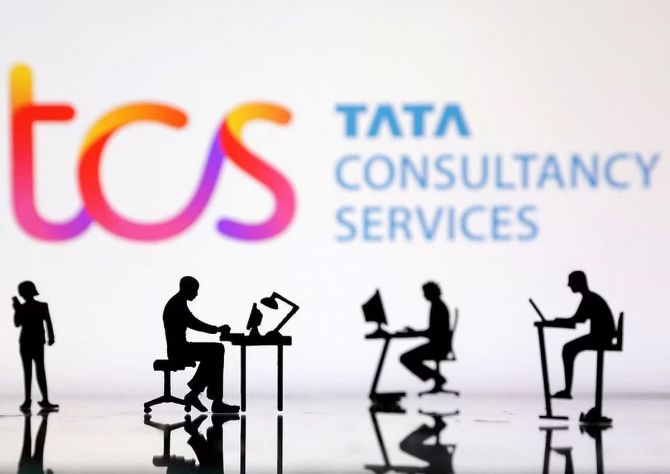'We do not see people getting reduced, but because of automation, we will do more work.'

The third quarter numbers for 2023-2024 from Tata Consultancy Services surpassed analyst estimates, but a detailed examination of these figures reveals the ongoing effects of global uncertainty.
But K Krithivasan, the company's managing director and CEO, maintains that there are no significant worries causing him sleepless nights.
In a conversation with Shivani Shinde/Business Standard at TCS House in Mumbai, Krithivasan discusses the slowdown in the banking, financial services, and insurance (BFSI) segment, the pace of generative AI (GenAI), and the opportunities ahead.
What is affecting BFSI growth? The December quarter witnessed a 3 per cent drop in revenue from the BFSI segment. The hi-tech and communication segment is lagging, too. Do you see any green shoots?
When we say BFSI, it has many different segments within it, such as banks, mortgages, and capital markets insurance. Hence there has been an impact from multiple dimensions on the sector.
We believe that as the supply chain improves, the interest rate regime changes, market predictability improves, and market sentiment improves, you will see improvement.
But if you look at the fundamentals, they are not bad. It is essentially about people thinking that something bad will happen -- they are waiting for a slowdown to happen, but that has not happened yet.
In another two quarters, things should improve.
Hi-tech is a different phenomenon. At present, a lot of internal calibration is happening as the sector has hired a lot and many ground realities have changed.
To me, the worry is the communication segment. They are undergoing structural issues. Companies have invested in 5G but the return on investment is not paying off, which is impacting further capex deployments. I am more optimistic about the other two verticals.
So, we will see green shoots in FY25...
Of course, the biggest mover for us will be when the BFSI and retail (segments) turn positive. We believe that BFSI will bottom out by next quarter, and the next (financial) year should be better.
We are seeing green shoots in the retail segment, too. But still early to call it out if Q4 will be good.

The total contract value (TCV) of $8.1 billion in Q3 against the $10 billion levels earlier is low. Why is there no mega deal in the pipeline?
Mega deals take some time to close. In some cases, the time taken from the start of conversation to the culmination is as much as two years.
The predictability of these are also difficult as many deals also need regulatory approval.
Similarly, we also believe the TCV will be lumpy. The way to look at the order book is the strength of the book.
Without any mega deal, we had a substantial amount of TCV in the third quarter. Also for medium-sized deals, the conversation is speedier.
You said four PoCs (proofs of concept) on GenAI have moved to production. Accenture's GenAI-led deals were worth $450 million. Is TCS slow in GenAI ramp-ups?
(With respect to) the pace of our engagements and PoCs that we are doing on GenAI and are moving into production, we are quite happy.
These are all new technologies; people have to experiment and see the value, and sometimes what works in a PoC may not yield the same result in the real world.
You will see more and more PoCs moving into production going ahead.
By when will GenAI be a considerable part of revenue?
I believe it will take about four to eight quarters. For us, it has to be a $1 billion unit before we talk about it.
This is the fourth straight quarter of UK-led growth. Do you see this momentum continuing? What is the headroom?
Sometimes your size itself is an advantage. Our market share in the UK technology spend is around 4 per cent, which is a big number.
If I am only around 4 per cent, there is 96 per cent of the market share (to compete for). It means you get to participate in all major deals.
We have reached a stage where we are part of every deal by default. Also, the kind of deals that we work in the UK is very transformational, particularly our platform approach.
Moreover, the presence of the Tata group in the UK is an additional accelerator.

Three concerns and opportunities that you see and will have an impact on TCS...
Opportunities -- the first is GenAI. We are still scratching the surface and a lot more will be done.
Second, more application modernisation. Many of the applications or the infrastructure of traditional industries like the banking and insurance sector were established 30 years ago; there is a huge opportunity there.
Third, is the manufacturing sector where Industry 4.0 is gaining traction.
Concerns -- I am not too worried actually.
TCS' headcount continues to drop. How much of this is because of GenAI or AI?
Automation and productivity is a continuing thing for us. Is it going to weigh on the number of people we hire? I do not think so.
Our take on automation is: The more we automate, the more work will come. So we do not see people getting reduced, but because of automation, we will do more work.
What is happening in terms of headcount drop is that we hired more proactively. But it has come very handy as we have been able to train them over the past six to nine months. We still have 13 per cent attrition.
Feature Presentation: Ashish Narsale/Rediff.com









